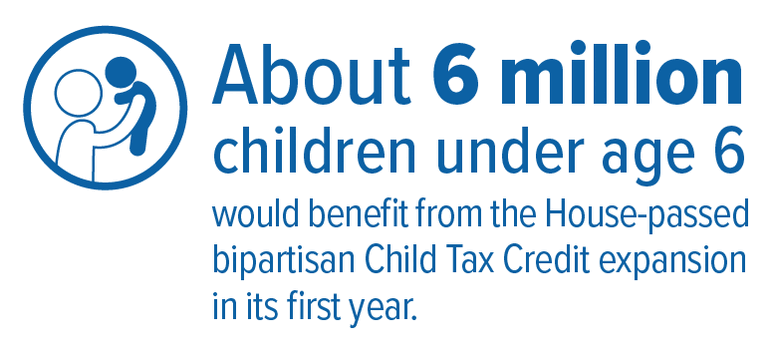BEYOND THE NUMBERS
Bipartisan Child Tax Credit Expansion Would Benefit About 6 Million Young Children
The House-passed bipartisan tax bill would expand the Child Tax Credit for 16 million children in families with low incomes — including 5.8 million young children (under age 6) — in its first year, bringing them up to or closer to the full $2,000-per-child amount that children in higher-income families receive. (See table below for state-specific estimates.) The Senate should pass it without further delay.

Young children of all races and ethnicities would benefit from the bill’s Child Tax Credit expansion. Overall, the expansion would deliver a larger credit to 1 in 4 children under age 6. It would benefit even larger shares of Black, Latino, or American Indian or Alaska Native young children, whose parents are overrepresented in low-paid work and may face more limited economic opportunities due to historical and ongoing discrimination and other structural barriers.
Looking at these children under 6, we estimate that:
- 39 percent of all Black;
- 37 percent of all Latino;
- 34 percent of all American Indian or Alaska Native;
- 16 percent of all white; and
- 15 percent of all Asian children of these ages would benefit.
The expanded Child Tax Credit would provide meaningful support to families. Consider, for example, a married couple with a kindergartner, a toddler, and a newborn. One parent earns $30,000 as a cashier while the other parent stays home to care for their children. The expansion would boost this family’s credit by $1,275 in the first year, helping them afford groceries, utility bills, and other necessary expenses.
Ample research indicates that providing additional income to families with low resources yields significant, lasting benefits for young children’s health, education, and future earnings. The Senate has an opportunity to help 1 in 4 children under age 6. Lawmakers should act quickly to pass the bipartisan tax package.
| About 6 Million Children Under 6 Would Benefit From House-Passed Bipartisan Child Tax Credit Expansion in First Year | |
|---|---|
| Estimated children under 6 who would benefit, by state | |
| Total U.S. | 5,800,000 |
| Alabama | 102,000 |
| Alaska | 14,000 |
| Arizona | 157,000 |
| Arkansas | 71,000 |
| California | 719,000 |
| Colorado | 65,000 |
| Connecticut | 40,000 |
| Delaware | 16,000 |
| District of Columbia | 9,000 |
| Florida | 369,000 |
| Georgia | 227,000 |
| Hawai’i | 21,000 |
| Idaho | 34,000 |
| Illinois | 208,000 |
| Indiana | 124,000 |
| Iowa | 48,000 |
| Kansas | 54,000 |
| Kentucky | 95,000 |
| Louisiana | 116,000 |
| Maine | 14,000 |
| Maryland | 70,000 |
| Massachusetts | 63,000 |
| Michigan | 178,000 |
| Minnesota | 69,000 |
| Mississippi | 71,000 |
| Missouri | 110,000 |
| Montana | 16,000 |
| Nebraska | 32,000 |
| Nevada | 59,000 |
| New Hampshire | 10,000 |
| New Jersey | 117,000 |
| New Mexico | 50,000 |
| New York | 327,000 |
| North Carolina | 196,000 |
| North Dakota | 8,000 |
| Ohio | 215,000 |
| Oklahoma | 86,000 |
| Oregon | 58,000 |
| Pennsylvania | 188,000 |
| Rhode Island | 13,000 |
| South Carolina | 99,000 |
| South Dakota | 16,000 |
| Tennessee | 144,000 |
| Texas | 708,000 |
| Utah | 54,000 |
| Vermont | 6,000 |
| Virginia | 112,000 |
| Washington | 101,000 |
| West Virginia | 33,000 |
| Wisconsin | 76,000 |
| Wyoming | 8,000 |
Notes: Estimates reflect a pre-pandemic economy and tax year 2023 tax rules. Figures are approximations based in part on Census Bureau data and may differ from those based solely on IRS data. Figures are rounded to the nearest 1,000.
Source: CBPP analysis of 2015 IRS Statistics of Income Public Use File for national total, allocated by state and race or ethnicity based on CBPP analysis of the American Community Survey for 2017-2019.
